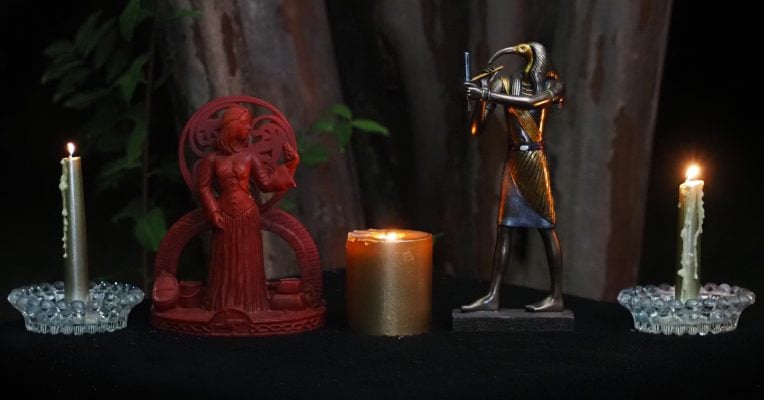Here are the top ten posts for the year on Under the Ancient Oaks, as measured by pageviews.
Only 2022 posts are eligible. I put that rule in because The Solitary Rituals and the 8 Things To Do series are always very popular and nobody wants to see the same posts on the Top 10 list year after year. But What To Do When You Think You’ve Been Hexed came out in November of 2021 and while it did well, it didn’t generate a big initial interest. Apparently people are finding it through Google, because in total it was the most widely read post of this year. Still, I’ve always done this based on “this year’s posts only” so that’s what I’m doing for 2022.
Thank you for reading Under the Ancient Oaks in 2022, and especially for liking, sharing, and commenting on social media and in the comments section.
10. When You Shouldn’t Talk About Your Spiritual Experiences (April 2022)
Most times, talking about our religious and spiritual experiences is a good thing. It reminds us that they really happened – it keeps us from rationalizing them away. It reminds other people that their experiences are real too, and that they shouldn’t rationalize them away.
But when talking about them would be unhelpful or even counterproductive, then I encourage you to keep them to yourself. Sometimes they’re only for you. Sometimes you’re not sure what you experienced. Sometimes the Gods tell you to keep silent. And sometimes sharing an experience is likely to be misunderstood.
9. 8 Pieces of Bad Advice (August 2022)
I listen to everybody. If someone tells me I should do something, I’ll consider it. But I always ask myself “does this make sense?” “Is this outdated?” And perhaps most importantly “will this help me or will it manipulate me for someone else’s benefit?”
This is the worst advice I’ve received over the course of my life. Things like “you have to pay your dues” and “always do more than what’s required” and perhaps the most dangerously false of all “do something you love and you’ll never work a day in your life.”
8. When a Mainstream Writer Sees the Bad Guys Using Magic (May 2022)
Mainstream journalist Dave Troy wrote that “the normal world that we’ve inhabited since the end of World War II — one filled with institutions, the rule of law, compromise, business reality, elections and politics — has been gradually and then suddenly supplanted by a world governed by the exercise of raw power.” He asks “what rules when progress, science, and law are replaced by power? Darkness, and the occult.”
The bad guys in our contemporary world are using magic, even though most of them don’t call it that. Those of us who practice magic more overtly need to pay attention and respond in kind.
7. Worshipping Deities From Different Cultures (September 2022)
The best way to approach the matter of deities from different cultures is from the ground up: from theology to culture to practice. The Gods call who They call. The racist and folkish Pagans who tell People of Color “our Gods would never call you” are placing human limitations on divine beings and that never ends well. Still, worship practices are often part of cultures that deserve our respect.
When we ground our practices in respect, dedication, and love, we are likely to be on the right path.
6. Which God are White Christian Nationalists Praying To? (June 2022)
As Pagans and polytheists, we should remember to interpret what we see through a polytheist worldview and to not default to a Christian worldview. We need to remember that not only are all Christians not the same, they aren’t even praying to the same God – even if they think they are.
Most of the Christian nationalists are praying to a God I’ll call “Yahweh-Paul-Calvin” – the vengeful God of the Old Testament, filtered through the missionary zeal and misogyny of Saul of Tarsus, and presented in the context of the cruelty, patriarchy, and might-makes-right of John Calvin.
Remember that liberal, moderate, and other inclusive Christians are our friends and allies, even if we see the world and the Gods differently. We cannot worship together, but we can work together to build a better world here and now.
5. What Is Seen Cannot Be Unseen (January 2022)
Sometimes people experience something that defies a materialist explanation. They have an encounter with a God, or an other-than-divine spirit, or they see magic work in a way that can’t be denied. All of a sudden they’re confronted with the fact that the world is a lot bigger and a lot stranger than they thought it was.
I know some people who got a look behind the curtain of consensus reality into a wider, Otherworldly reality. They ran away screaming, a couple of them literally.
But also, there was a time in my own life when I stood at a line, knowing what it meant to cross it – and also what it meant to turn back. My fear of regret was greater than my fear of what might lie on the other side of that line, and so I stepped across.
4. Worshipping Gods From Different Pantheons (January 2022)
In ancient times, people grew up knowing their Gods: the Gods of their family, of their city, of their land. If they moved they might carry the worship of their Gods with them, or they might adopt the worship of the Gods of their new land. Or they might do both.
We live in a different era. Few of us are born into a relationship with a deity. Few deities have a multi-generation relationship with people. We are trying to build relationships and communities among and between Gods and humans. That’s not a neat and easily defined process.
The Gods call who They call. Sometimes Gods from different pantheons call the same person. That makes things more complicated. But it also brings more opportunities.
3. Answering the Call of Cernunnos (March 2022)
There are no ancient Cernunnos myths that have survived to our time. Learning about Cernunnos is largely a matter of independent study, with more field work than classroom work. That strikes me as very appropriate for a God of Nature and a God of the Wild. But that makes things more challenging for people who feel called to Cernunnos and are unsure how to get started.
There is, of course, no one right answer. But this is what I’ve done, and what I’ve seen others do that worked for them.
2. Explaining Paganism to the Curious but Religiously Ignorant (Feb 2022)
Most people who ask “what is Paganism?” aren’t looking to read a book. They want you to explain everything in under a minute. They want a creed, or perhaps a mission statement. They’re likely to be working from a Christian worldview – they may ask questions that are important to them but are completely irrelevant in Paganism and polytheism.
There’s no way to truly describe an entire religion in under 50 words. So for those who are willing to have a conversation over a glass of wine or a cup of tea, I offer this guide to explaining Paganism to those who are genuinely curious (i.e. – they want to learn for the sake of learning, not so they can proselytize) but who have some inaccurate and unhelpful assumptions about what religion is and isn’t.
1. Three Messages from Loki to the World (July 2022)
At a Seiðr oracular ritual at this year’s Mystic South, someone had a question for Loki.
And He showed up.
He didn’t just whisper words to the Seeress in Helheim for her to relay. He took full control of the Seeress. She knew what was going on but it was Loki speaking and moving her body here in this world.
I wrote this post as a journalist, not as an oracle. Loki did not speak through me or to me. He spoke through the Seeress, to those who asked questions and to the assembly in general. But He made it clear to them that He wanted these messages spread to the world.
Loki had three messages for the world.
This has been a down year for blogging, but this post would have ranked no worse than 4th in any of the nine years I’ve been doing Top 10 lists – most years it would have been 1st or 2nd.
Loki wanted his message to get out, and it did.





















